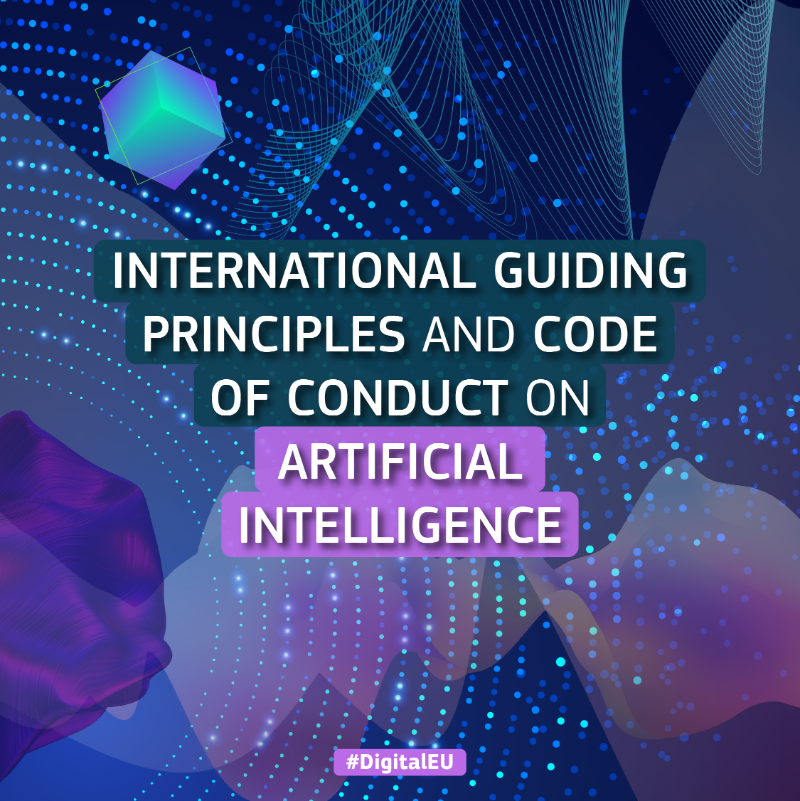
These principles and the voluntary Code of Conduct will complement, at international level, the legally binding rules that the EU co-legislators are currently finalising under the EU AI Act. President of the European Commission, Ursula von der Leyen, was among those who subscribed to the G7 leaders' statement issued by the 2023 Japan G7 presidency.
President von der Leyen, said: “The potential benefits of Artificial Intelligence for citizens and the economy are huge. However, the acceleration in the capacity of AI also brings new challenges. Already a regulatory frontrunner with the AI Act, the EU is also contributing to AI guardrails and governance at global level. I am pleased to welcome the G7 international Guiding Principles and the voluntary Code of Conduct, reflecting EU values to promote trustworthy AI. I call on AI developers to sign and implement this Code of Conduct as soon as possible.”
Ensuring safety and trustworthiness of the technology
The eleven Guiding Principles adopted by the leaders of the seven countries and the EU, which make up the G7, provide guidance for organisations developing, deploying and using advanced AI systems, such as foundation models and generative AI, to promote safety and trustworthiness of the technology. They include commitments to mitigate risks and misuse and identify vulnerabilities, to encourage responsible information sharing, reporting of incidents, and investment in cybersecurity as well as a labelling system to enable users to identify AI-generated content.
Informed by the results of a stakeholder survey, these principles have been jointly developed by the EU with the other G7 members, under the Hiroshima Artificial Intelligence Process. The Guiding Principles have in turn served as the basis to compile a Code of Conduct, which will provide detailed and practical guidance for organisations developing AI. The voluntary Code of Conduct will also promote responsible governance of AI globally. Both documents will be reviewed and updated as necessary, including through inclusive multistakeholder consultations, to ensure they remain fit for purpose and responsive to this rapidly evolving technology. The G7 leaders have called on organisations developing advanced AI systems to commit to the application of the International Code of Conduct. The first signatories will be announced in the near future.
Background
The G7 Hiroshima Artificial Intelligence Process was established at the G7 Summit on 19 May 2023 to promote guardrails for advanced AI systems on a global level. The initiative is part of a wider range of international discussions on guardrails for AI, including at the OECD, the Global Partnership on Artificial Intelligence (GPAI) and in the context of the EU-U.S. Trade and Technology Council and the EU's Digital Partnerships.
Since first announcing its intention to work on a Code of Conduct at the TTC Ministerial of 31 May 2023, the European Commission actively worked with key international partners in the G7 to develop the principles and the Code of Conduct on AI. These international commitments are consistent with the legally binding rules currently being negotiated as part of the more comprehensive Artificial Intelligence Act (EU AI Act), which will apply in the EU.
The proposal for the EU AI Act will guarantee the safety and fundamental rights of people and businesses, while strengthening AI uptake, investment and innovation across the EU. The AI Act will provide risk-based, legally binding rules for AI systems that are placed on the market or put into service in the Union market.
For More Information
G7 AI International Guiding Principles
G7 AI International Code of Conduct
Proposal for a European Artificial Intelligence Act
Quote(s)
The potential benefits of Artificial Intelligence for citizens and the economy are huge. However, the acceleration in the capacity of AI also brings new challenges. Already a regulatory frontrunner with the AI Act, the EU is also contributing to AI guardrails and governance at global level. I am pleased to welcome the G7 international Guiding Principles and the voluntary Code of Conduct, reflecting EU values to promote trustworthy AI. I call on AI developers to sign and implement this Code of Conduct as soon as possible.
Ursula von der Leyen, President of the European Commission - 30/10/2023
Trustworthy, ethical, safe and secure, this is the generative artificial intelligence we want and need. With the international principles and the Code of Conduct, the EU and our like-minded partners can lead the way in making sure AI brings benefits while addressing its risks. We call on developers of generative AI to commit to the application of the Code of Conduct.
Věra Jourová, Vice-President for Values and Transparency - 30/10/2023
With the AI Act, the EU is a global frontrunner in setting clear and proportionate rules on AI to tackle risks and promote innovation. I am pleased to see the risk-based approach of the EU AI Act reflected in the international guiding principles that are agreed today.
Thierry Breton, Commissioner for Internal Market - 30/10/2023
Details
- Publication date
- 30 October 2023
- Author
- Representation in Cyprus
